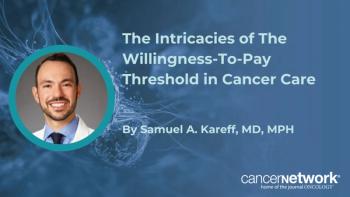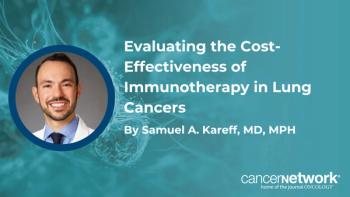
- ONCOLOGY Vol 11 No 10
- Volume 11
- Issue 10
Doublets and Triplets: New Drug Combinations in the Palliative Care of NSCLC
Chemotherapy has been shown to prolong survival in patients with stage IV non-small-cell lung cancer (NSCLC). However, traditional cisplatin (Platinol)-containing regimens are associated with significant toxicity.
ABSTRACT: Chemotherapy has been shown to prolong survival in patients with stage IV non-small-cell lung cancer (NSCLC). However, traditional cisplatin (Platinol)-containing regimens are associated with significant toxicity. Furthermore, response rates rarely exceed 30%, and median survival times have averaged 25 to 30 weeks. In an effort to improve these results, we have conducted studies integrating new, active single agents into novel combination regimens. In a phase I/II study, the combination of ifosfamide (Ifex) and vinorelbine (Navelbine) was associated with a response rate of 40% and few subjective toxicities. In a phase I study of ifosfamide plus paclitaxel (Taxol), partial responses were observed in 23% of patients, with a median survival of 6 months and a 1-year survival rate of 25%. Another phase I study found a partial response rate of 21% with this combination. Further studies of these “doublet” regimens are in progress. A phase II study is currently evaluating the use of all three drugs (ifosfamide, vinorelbine, and paclitaxel) in one “triplet” combination regimen. Results should be available in the near future. [ONCOLOGY 11(Suppl 12):35-38, 1997]
Patients with stage IV non-small-cell lung cancer (NSCLC) or those with stage IIIB disease with pleural effusion are generally treated with palliative intent.[1-3] The goals of treatment are the amelioration of symptoms and prolongation of life. Treatment usually consists of combination chemotherapy.
During the 1980s, two- or three-drug regimens, typically based on the use of cisplatin (Platinol) in combination with a Vinca alkaloid, were shown to result in overall response rates of approximately 30%. Studies comparing such an approach with best supportive care alone (ie, no chemotherapy) generally suggested an increase in median survival time favoring chemotherapy (approximately 25 to 30 weeks vs 17 weeks with best supportive care alone). Recent meta analyses have confirmed a statistically significant improvement with chemotherapy and have solidified its role in the palliative care of non-small-cell lung cancer.[4-7]
During the early 1990s, several new drugs with activity in non-small-cell lung cancer have been identified. These include taxanes, such as paclitaxel (Taxol) and docetaxel (Taxotere), gemcitabine (Gemzar), irinotecan (Camptosar), and vinorelbine (Navelbine).[8-9]
Clinical studies at the University of Chicago have focused on vinorelbine.[10-11] This agent is a novel semisynthetic Vinca alkaloid that acts as a tubulin assembly inhibitor, much like other Vinca alkaloids. When combined with cisplatin, vinorelbine has been shown to result in survival rates superior to those achieved with single-agent cisplatin, single-agent vinorelbine, or the combination of cisplatin and vindesine (Eldisine).[12-13] As a result, the combination of cisplatin and vinorelbine can be considered one possible standard regimen for stage IV non-small-cell lung cancer at present.
Nevertheless, using the cisplatin/vinorelbine combination, median survival time remains at 40 weeks or less, and no patients have been cured. In addition, the frequently severe and cumulative subjective side effects of cisplatin, including ototoxicity, neurotoxicity, fatigue, and nausea/vomiting, may impact on patients quality of life.
Based on these data, it is important to continue attempts to identify regimens with higher activity and/or more favorable toxicity profiles. We have, therefore, attempted to identify regimens that will result in less subjective toxicity, as well as novel two- or three-drug regimens using drugs with established single-agent activity but more favorable toxicity profiles.
This effort has called for the identification of non-cisplatin-based regimens. Consequently, beginning in 1993, we initiated three phase I and II studies to evaluate the combination of ifosfamide (Ifex) with vinorelbine, paclitaxel, or both drugs. A brief overview of these three studies follows.
The enrollment criteria for the three studies have been described elsewhere.[13] Briefly, patients were evaluated during a multidisciplinary chest oncology conference. Eligible patients had histologically or cytologically diagnosed stage IIIB or IV non-small-cell lung cancer with measurable or evaluable disease and were treated with palliative intent. The patients had received no previous chemotherapy and had a performance status of 0 to 2 (Cancer and Leukemia Group B [CALGB] scale). Previous palliative radiation therapy was allowed.
Ifosfamide Plus Vinorelbine
Table 1 shows the dose-escalation scheme used in the study that evaluated the combination of ifosfamide and vinorelbine.[13] This regimen was based on a novel schedule of vinorelbine administration in which the drug was given on three consecutive days together with ifosfamide and mesna uroprotection. This schedule differs from the usual weekly administration of the drug. Myelosuppression was expected to be the dose-limiting toxicity of the regimen, and this cyclic administration of both drugs more easily allowed for the addition of granulocyte colony-stimulating factor (G-CSF, filgrastim [Neupogen]) on days 5 through 12.
A total of 40 patients entered this study. The phase II doses identified were 1.6 g/m2/day of ifosfamide with mesna uroprotection and 30 mg/m2/day of vinorelbine. The response rate was 40% and the median survival time was 50 weeks. Few subjective toxicities were noted. A detailed review of this study is being prepared for publication in the near future. In addition, the regimen is undergoing phase II evaluation in the palliative care setting of stage III/IV non-small-cell lung cancer in the CALBG cooperative group setting.
Ifosfamide Plus Paclitaxel
Table 2 presents the dose-escalation scheme for the study that evaluated an ifosfamide/paclitaxel combination.[14] Chemotherapy again consisted of ifosfamide administered over three consecutive days with mesna uroprotection. Paclitaxel was administered on day 1 over 24 hours. In the final two dose levels, paclitaxel was administered as a 1-hour infusion on day 1 following the administration of ifosfamide. Paclitaxel, 250 mg/m2, was identified as the recommended phase II dose (on each schedule).
The final results of this study were recently published.[14] In brief, the study assessed 31 patients with a median age of 62 years. The dose-limiting side effect was myelosuppression, neutropenia in particular, whereas little thrombocytopenia was observed. Few additional toxicities were documented. Three patients experienced possible cardiac toxicity; one had paroxysmal atrial fibrillation, and two had asymptomatic bradycardia. Mild to moderate peripheral neuropathy developed in several patients. In addition, transient abnormal mental status and somnolence developed in two patients.
Partial responses were seen in 7 patients (23% of the total or 27% of evaluable patients), including 5 of 14 individuals who received a paclitaxel dose of 250 mg/m2 and 2 of 4 patients who received 300 mg/m2. An additional 10 patients had either minor regression or stable disease. In the entire patient population of this phase I study, the median duration of survival was 6 months, and the 1-year survival rate was 25%. Phase II evaluation of this regimen is currently also in progress in the CALBG cooperative group setting.
The results of a second phase I study evaluating the combination of ifosfamide and paclitaxel were reported.[15] The patients received a 1-hour infusion of ifosfamide and a 3-hour infusion of paclitaxel every 3 weeks. The recommended phase II doses were 4 g/m2 of ifosfamide and 225 g/m2 of paclitaxel. The partial response rate was 21%.
Ifosfamide Plus Vinorelbine and Paclitaxel
In view of the fact that the two doublet regimens seem to have favorable toxicity and activity profiles, we are currently investigating the administration of all three drugs (ifosfamide, vinorelbine, and paclitaxel) in one combination regimen. All three drugs have single-agent activity. In addition, vinorelbine and paclitaxel may have a synergistic interaction.[16] The dose-escalation scheme is shown in Table 3.
To date, 31 patients have been entered into the study. We have identified the following as our recommended phase II doses: ifosfamide, 1.2 g/m2/day; vinorelbine, 20 mg/m2/day for three doses; and paclitaxel, 135 mg/m2 over three hours on day 2. Myelosuppression has been the dose-limiting toxicity. Phase II testing of the regimen is currently in progress in an oligoinstitutional setting.
We conclude from these preliminary results that non-cisplatin-based doublet or triplet regimens can have activity in non-small-cell lung cancer. Preliminary data on the combination of ifosfamide and vinorelbine indicate a response rate of 40%, with good subjective tolerance. Similarly, the combination of ifosfamide and paclitaxel appears to be active.
Further evaluation of these doublet regimens is currently in progress at the cooperative group level. It is hoped that response and survival data from these studies will provide further evidence supporting continued investigations of these regimens. Should substantial activity be demonstrated, investigations of these drugs in the curative care setting, as part of a multimodality therapy approach in stage III disease, should also be considered.
Phase II evaluation of the three-drug combination of ifosfamide, paclitaxel, and vinorelbine is currently in progress as well. Preliminary data indicate that the addition of a third drug necessitates a significant dose reduction of all three single agents in the combination. This approach may be acceptable, as no evidence supports a strong dose-response relationship for any of the drugs in this combination. We hope to have additional results available from this study in the near future.
References:
1. Vokes EE, Bitran JD: Non-small cell lung cancer: Towards the next plateau. Chest 106:659-661, 1994.
2. Ginsberg RJ, Kris MG, Armstrong JG: Non-small Cell Lung Cancer, in DeVita VT Jr, Hellman S, Rosenberg SA (eds): Cancer: Principles and Practice of Oncology, 4th ed, pp 673-723. Philadelphia, Lippincott, 1993.
3. Liu RJ: Chemotherapy outcomes in advanced non-small-cell lung carcinoma. Semin Oncol 10:296-301, 1993.
4. Grilli R, Oxman AD, Julian JM: Chemotherapy for advanced non-small cell lung cancer: How much benefit is enough? J Clin Oncol 11:1866-1872, 1993.
5. Souquet PJ, Chauvin F, Boissel JP, et al: Polychemotherapy in advanced non-small cell lung cancer: A meta-analysis. Lancet 342:19-21, 1993.
6. Marino P, Pampallona S, Prestoni A, et al: Chemotherapy versus supportive care in advanced non-small cell lung cancer: Results of a meta-analysis of the literature. Chest 106:861-865, 1994.
7. Stewart LA, for the Non-small Cell Lung Cancer Collaborative Group: Chemotherapy in non-small cell lung cancer: A meta-analysis using updated data on individual patients from 52 randomized clinical trials. Br Med J 331:899-909, 1995.
8. Lilenbaum RC, Green MR: Novel chemotherapeutic agents in the treatment of non-small-cell lung cancer. J Clin Oncol 11:1391-1402, 1993.
9. Feigal EG, Christian M, Cheson B, et al: New chemotherapeutic agents in non-small-cell lung cancer. Semin Oncol 20:185-201, 1993.
10. Vokes E: Integration of vinorelbine into chemotherapy strategies for non-small cell lung cancer. Oncology 9:565-577, 1995.
11. Masters GA, Drinkard LC, Hoffman PC, et al: A phase I/phase II study of vinorelbine with cisplatin, 5-fluorouracil and leucovorin for advanced non-small cell lung cancer. Cancer J Am Sci 1:288-294, 1995.
12. Le Chevalier T, Brisgand D, Douillard J-Y, et al: Randomized study of vinorelbine and cisplatin vs vindesine and cisplatin vs vinorelbine alone in advanced non-small-cell lung cancer: Results of a European multicenter trial including 612 patients. J Clin Oncol 12:360-367, 1994.
13. Wozniak AJ, Crowley JJ, Balcerzak SP, et al: Randomized phase III trial of cisplatin (CDDP) vs CDDP plus Navelbine (NVB) in treatment of advanced non-small cell lung cancer (NSCLC): Report of a Southwest Oncology Group Study (SWOG-9108). Proc Am Soc Clin Oncol 15:374, 1996.
14. Hoffman PC, Masters GA, Drinkard LC, et al: Ifosfamide plus paclitaxel in advanced non-small cell lung cancer: A phase I study. Ann Oncol 7:314-316, 1996.
15. Shephert FA, Latreille J, Crump M, et al: Phase I study of paclitaxel (Taxol) and ifosfamide in previously untreated patients with advanced non-small-cell lung cancer. A study of the National Cancer Institute of Canada Clinical Trials Group. Ann Oncol 7:311-313, 1996.
16. Knick VC, Eberwein DJ, Miller CG: Vinorelbine tartrate and paclitaxel combinations: Enhanced activity against in vivo p388 murine leukemia cells. J Natl Cancer Inst 87:1072-1077, 1995
Articles in this issue
over 28 years ago
Vinorelbine in Non-Small-Cell Lung Cancerover 28 years ago
Paclitaxel and Vinorelbine in Non-Small-Cell Lung Cancerover 28 years ago
Safety Data From North American Trials of Vinorelbineover 28 years ago
Cisplatin Alone vs Cisplatin Plus Vinorelbine in Stage IV NSCLCover 28 years ago
Current Management of Unresectable Non-Small-Cell Lung Cancerover 28 years ago
The Economics of Prostate Cancer ScreeningNewsletter
Stay up to date on recent advances in the multidisciplinary approach to cancer.
Related Content




Evaluating the Cost-Effectiveness of Immunotherapy in Lung Cancers
















































